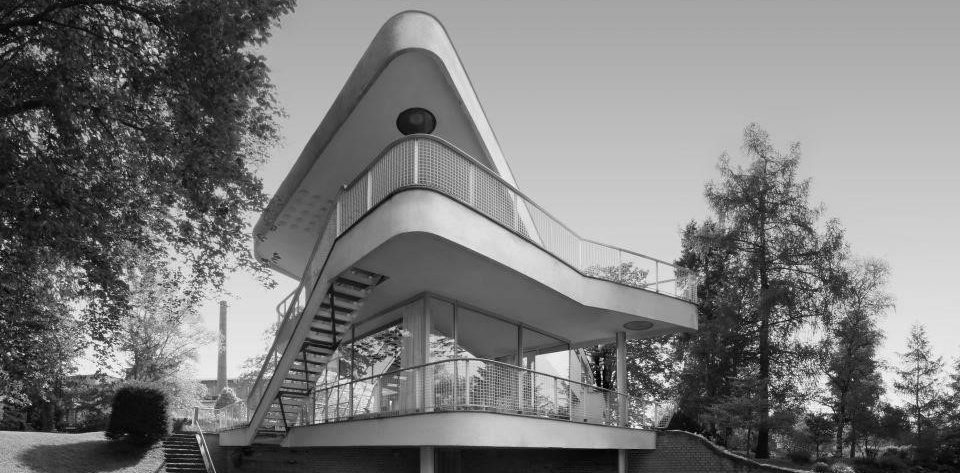Event Information
“Bauhaus, Design, and the Livable Anthropocene” celebrates the innovative approach to design and architecture developed at the Bauhaus School, founded in Weimar, Germany, in 1919. The aim is to reflect on the historical impact of this approach, and explore its potential for addressing the design challenges of the Anthropocene. The bau1haus photographs by Jean Molitor, brought to UVic by the Consulate General of the Federal Republic of Germany Vancouver, show an exceptionally beautiful record of modernist buildings worldwide.
Opening of Exhibition and Colloquium: 11:30-15:30, Saturday, 2 October 2021, Mearns Centre for Learning – McPherson Library, Room 129.
bau1haus Exhibition: 2 – 31 October 2021, McPherson Library, main floor.
Contact person and organiser: Thomas Heyd Ph.D., Department of Philosophy, University of Victoria, heydt@uvic.ca.
Colloquium Zoom connection: 10:30-15:00, https://uvic.zoom.us/j/88586570720
Colloquium website: https://onlineacademiccommunity.uvic.ca/bauhaus2021/
Online Exhibition of photographs: https://omekas.library.uvic.ca/s/Bauhaus/page/JM
Colloquium Youtube streaming: https://www.youtube.com/watch?v=nQVmNnkL55Q
Programme
11:30-11:40 Territorial Acknowledgement and Welcome, by Dean of Humanities, Annalee Lepp
11:40-11:45 Welcome to the Library, by University Librarian, Jonathan Bengtson
11:45-11:55 Opening of the Colloquium and presentation of Keynote Speaker, by Chair of Art History and Visual Studies, Marcus Millwright
11:55-12:35 Keynote Speaker, Dr. Ulduz Maschaykh (Architectural History), “Dwelling Architecture – an Exploration of Housing Solutions for Challenges in the 21st Century”
12:35-12:45 Questions from the floor
12:40-12:50 Inauguration of Jean Molitor’s bau1haus Photo Exhibition, by the Consul General of the Federal Republic of Germany Vancouver, Dr. Klaus Otto Schmidt
12:50-13:20 Viewing of the Exhibition and Refreshment Break
13:20-13:40 Menno Hubregtse (Art History and Visual Studies), “Bauhaus, Dieter Rams and Good Design”
13:40-14:00 Elena Pnevmonidou (Germanic and Slavic Studies), “Environmental Humanities, Bauhaus and the Anthropocene”
14:00-14:30 Panel discussion with Ulduz Maschaykh, Menno Hubregtse and Elena Pnevmonidou, “Relevance of the Bauhaus approach in the times of the Anthropocene”
14:30-14:40 Questions from the floor and Break
14:40-15:30 Guided tour of Bauhaus-inspired buildings on campus by Don Lovell, Retired Architect
Acknowledgments
With thanks to the Consulate General of the Federal Republic of Germany Vancouver, the Mearns Centre – McPherson Library, the Faculty of Humanities, the Department of Art History and Visual Studies, European Studies, the Department of German and Slavic Studies, the Centre for Global Studies, the Department of Philosophy, PICS, and UVic in the Anthropocene, as well as to the speakers, Ulduz Maschaykh, Menno Hubregste and Elena Pnevmonidou, and to the campus architecture guide Don Lovell. Special thanks to the Consulate General of the Federal Republic of Germany Vancouver for supplying the bau1haus exhibition, in particular to Dr. Schmidt and Ms. Daiminger, and to Michael Lines and Lisa Abram from the Mearns Centre – McPherson Library for their support in the planning of this event. For more information on UVic in the Anthropocene, please visit our website.
Territory Acknowledgement
We acknowledge with respect the lək̓ʷəŋən (Lekwungen) peoples on whose traditional territory the university stands and the Songhees, Esquimalt and WSÁNEĆ peoples whose historical relationships with the land continue to this day. This acknowledgment entails a commitment to ongoing dialogue and reconciliation with the peoples of these lands.
Keynote Speaker: Ulduz Maschaykh, Ph.D.
“Dwelling Architecture – an Exploration of Housing Solutions for Challenges in the 21st Century“ (Abstract)
If housing is a reflection of a society’s sense of morale that embodies a considerable amount of individual and social values it remains imperative to pay attention to architectural dwelling solutions that serve a broader target group of society. During the interwar years architects of Bauhaus and Red Vienna raised the bar of their profession by directing their work to the benefit of the public good. Large-scale housing estates were designed as a solution to the needs of society and the working class. Design played a large role in bringing people together and enhancing the living standards of common people. In creating housing for the masses, the architects’ profession was elevated to a highly ethical standard that pivoted the role of the architect toward a social focus. In the 21 century cities all across the globe are increasingly faced with abrupt, negative changes in housing security and affordability, as well as intangible factors such as human isolation, gentrification and climate change. This presentation examines the role of dwelling architecture with a historical overview from the inception of Bauhaus to the 21st century. Particular focus will be on the current developments in affordable housing in British Columbia. The case studies examined will be concerning the question: When it comes to architecture, to what extent does design create de-stigmatization and foster the continuation of an inclusive society?
Photo credit : Jean Molitor (2014). Building: Haus Schminke, Löbau, built by Hans Scharoun 1932—33
